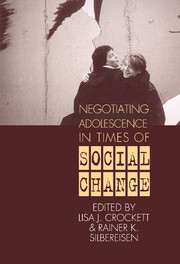Book contents
- Frontmatter
- Contents
- Contributors
- Preface
- 1 Social Change and Adolescent Development: Issues and Challenges
- Part I Models of Social Change Effects
- Part II Social Change and Adolescent Transitions
- Part III Social Change and Adolescents' Social Contexts
- Part IV Implications of Social Change for Adolescent Health and Well-Being
- Part V Interventions: Promoting Healthy Development in Times of Social Change
- 16 Research, Intervention, and Social Change: Improving Adolescents' Career Opportunities
- 17 Preparing Adolescents for Social Change: Designing Generic Social Interventions
- 18 Adolescents in the 21st Century: Preparing for an Uncertain Future
- Endnotes
- Index
18 - Adolescents in the 21st Century: Preparing for an Uncertain Future
Published online by Cambridge University Press: 26 January 2010
- Frontmatter
- Contents
- Contributors
- Preface
- 1 Social Change and Adolescent Development: Issues and Challenges
- Part I Models of Social Change Effects
- Part II Social Change and Adolescent Transitions
- Part III Social Change and Adolescents' Social Contexts
- Part IV Implications of Social Change for Adolescent Health and Well-Being
- Part V Interventions: Promoting Healthy Development in Times of Social Change
- 16 Research, Intervention, and Social Change: Improving Adolescents' Career Opportunities
- 17 Preparing Adolescents for Social Change: Designing Generic Social Interventions
- 18 Adolescents in the 21st Century: Preparing for an Uncertain Future
- Endnotes
- Index
Summary
These are very interesting times because many aspects of life are in flux. As the authors of the two preceding chapters contend, an important responsibility of adults in a society is to prepare adolescents for the future, and yet no one can predict exactly what the future will bring. This uncertainty is not lost on young people, who reflect this ambiguity. What can guide us in these times? Is it best to assume that the future will not be so different from the past? Or is it best to prepare for ambiguity by attaining basic skills adaptable to most any future? What are the basics of preparation and the constants in life? How can research add to our knowledge of these issues?
In this commentary on the two previous chapters, I shall attempt to address these questions, taking a global perspective to the extent possible for me. I first review what I regard as the central points of the two chapters in addressing the questions together with some other interesting perspectives on the issues. I then attempt to provide a holistic perspective on what we might do in these uncertain times.
The two preceding chapters identify important issues in preparing adolescents in the current times, at least in the United States. As Takanishi (this volume) notes, current interventions rarely prepare adolescents for tremendous social change. At the same time, she notes that humans are remarkably adaptable – at least over evolutionary time.
- Type
- Chapter
- Information
- Negotiating Adolescence in Times of Social Change , pp. 294 - 298Publisher: Cambridge University PressPrint publication year: 1999



